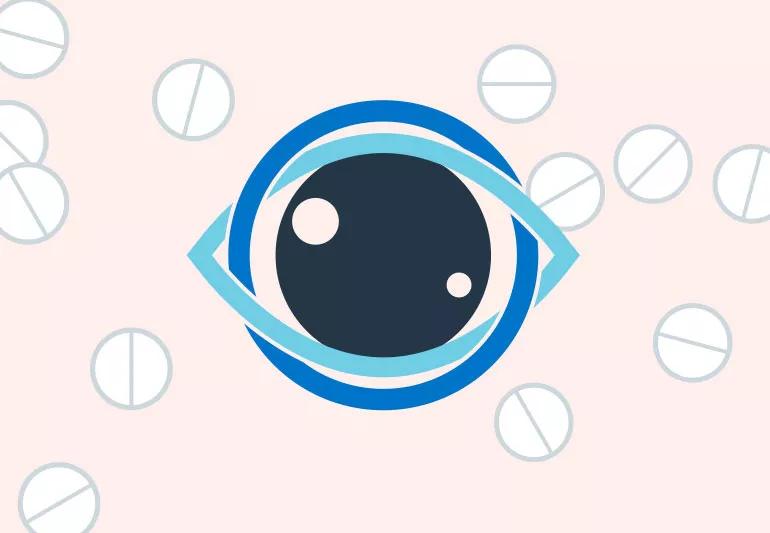Weighing benefits against age-related macular degeneration risk

Image content: This image is available to view online.
View image online (https://assets.clevelandclinic.org/transform/d7bdc38a-3be4-42d0-ad8f-4b64000a7617/aspirinEyes-1180510130-770x553-1_jpg)
aspirin and its effect on eyes
Many take aspirin frequently to either reduce the risk of heart attack or stroke or simply just to control pain. However, reports have been circling for the past few years linking aspirin use and eye disease, such as age-related macular degeneration (AMD).
Advertisement
Cleveland Clinic is a non-profit academic medical center. Advertising on our site helps support our mission. We do not endorse non-Cleveland Clinic products or services. Policy
Could your aspirin use be putting your sight at risk?
“It’s a good question, but there doesn’t appear to be a major link,” says eye surgeon Rishi Singh, MD. “It is a concern, but it’s not large enough to stop what you are doing.”
Some researchers see a link between regular aspirin use and AMD. Although researchers’ definition of “regular use” varies, people in the studies generally are in this category if they use aspirin once or more a week for more than a month.
This issue principally affects older patients. AMD affects about 1.8 million people and is a leading cause of blindness in people over the age of 50, many of whom take aspirin to relieve arthritis pain or reduce the risk of heart attack and stroke.
Wet (neovascular) AMD is responsible for most dramatic vision loss in patients. It’s less prevalent and only seen in about 10% of people with AMD. Wet AMD happens when a protein makes too many blood vessels grow in the back of your eye, leading to blindness.
“With this condition, vessels leak blood into the retina, causing damage and distorted vision,” says Dr. Singh. “Eventually, if scar tissue forms, it can permanently block the central vision.”
Dry AMD is much more common, but progresses slowly and doesn’t cause sudden vision loss. It occurs when yellow deposits form on the middle of the retina (macula). If enough of these deposits form, you begin to notice poorer vision, especially when you read. If the condition continues to advance, it can also lead to central vision loss.
Advertisement
“An important point about studies on aspirin use is that people who regularly use aspirin are typically older and more likely to have cardiovascular disease, diabetes and hypertension,” he says. “All of these conditions also increase the risk of getting AMD.”
Research on the topic has mixed results. Some studies suggest a possible worsening of AMD while there are a few that actually suggest a possible benefit for AMD.
One recent study found no significant association between aspirin use and progression to late AMD. The benefits of using aspirin to decrease your risk of heart problems far outweigh AMD risks, too.
Another study found that regular users of aspirin were twice as likely to have wet AMD over the long-term than those not taking it regularly. However, the differences were reduced when factoring in people who had not had cardiovascular disease.
On the other hand, one large-scale study found that low-dose aspirin use may actually slightly reduce the chances of getting AMD. (Researchers stopped the trial early, however, because of aspirin’s marked beneficial effects on heart attack risk.)
“When researchers take everything into account, including risks for AMD and the benefits of reducing risk for cardiovascular events, aspirin is clearly beneficial,” says Dr. Singh. “It may increase the risk of AMD slightly, but it can dramatically reduce the risk of life-threatening conditions.”
In fact, regular users of aspirin had a 32% lower rate of strokes and were 15% less likely to have a heart attack than people who didn’t use aspirin regularly, according to a report from the American Society of Retina Specialists.
“It could be that aspirin does affect AMD, but the small potential doesn’t trump the effect on the heart,” he says.
If you do take aspirin frequently for its other health benefits, it’s a good idea to have your vision checked regularly.
Advertisement

Sign up for our Health Essentials emails for expert guidance on nutrition, fitness, sleep, skin care and more.
Learn more about our editorial process.
Advertisement
A reaction to the medication may trigger preexisting asthma and result in sinus or skin reactions
Here's the latest guidance on who should (and shouldn't) do this for heart health
Aspirin can help you — or hurt you
Act quickly by locating the object, gently removing the debris and flushing your eye
Pink eye tends to start in one eye before spreading to the other, while allergies usually affect both eyes at the same time
A correct prescription helps your eyes see clearly — but as natural changes occur, you may need stronger or different eyeglasses
The differences are few, but ophthalmologists can perform eye surgeries and more complex procedures
The little blue pill might help with physical arousal, but there are better treatments for low libido in women
Prioritize your health by managing stress, strengthening your social connections and getting quality sleep
Bolsters, blankets, pillows and blocks can offer extra support, stability and comfort
Allergies, postnasal drip, asthma or reflux could be to blame for a cough that won’t quit